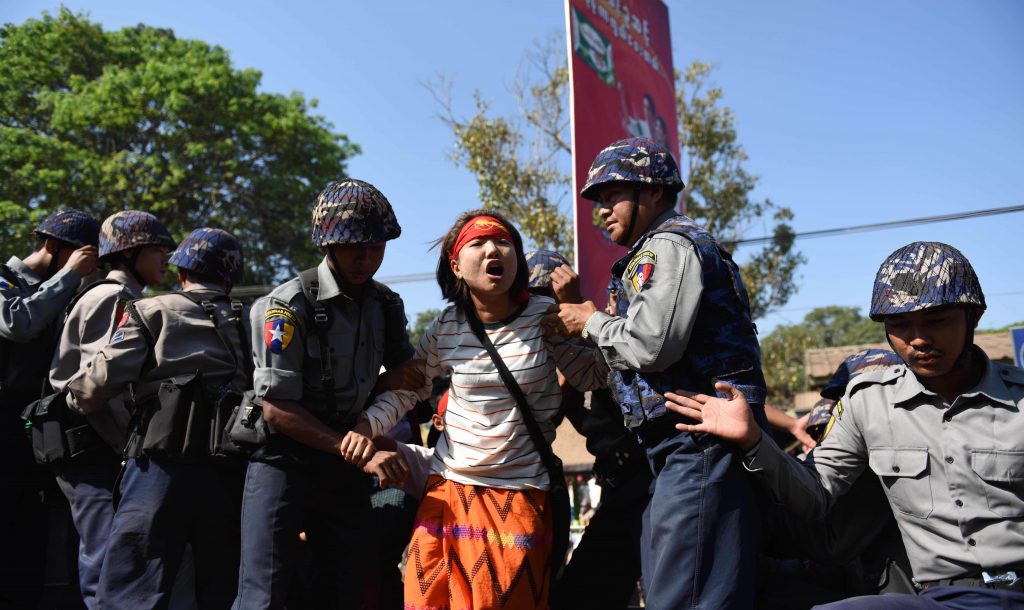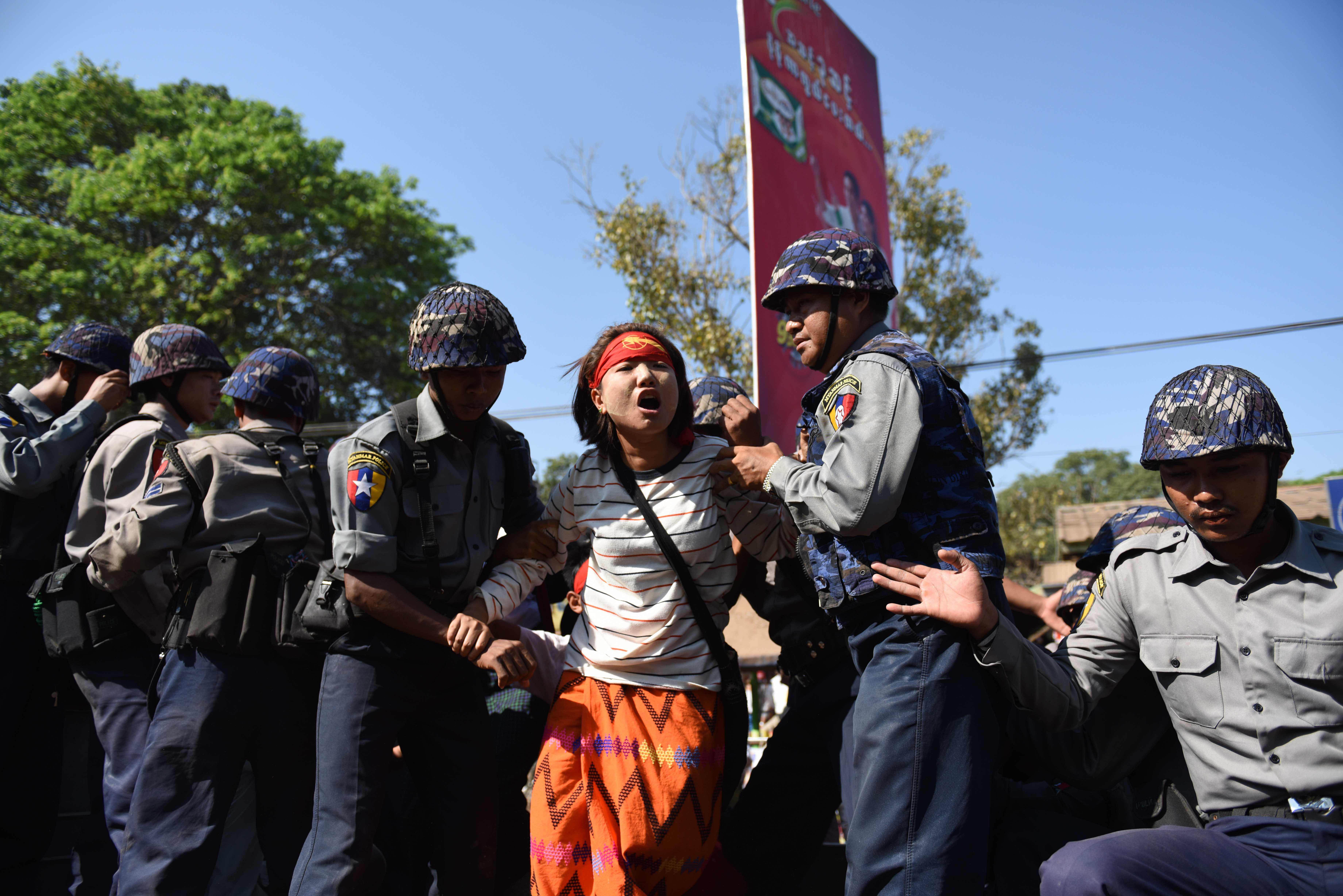Myanmar’s new government will need to prioritise workers’ rights and conditions.
Labour reforms are likely to be a high priority for the new National League for Democracy (NLD) government in Myanmar.
Workers and worker organisations represent core support groups for the NLD, and have long been conspicuous in their vigorous advocacy for more democratic workplaces and fairer work practices. The NLD’s official manifesto, issued in September 2015 ahead of last November’s elections, incorporates several general commitments to improve working conditions in Myanmar.
Among the NLD’s core commitments are “to lift the living standards of our people’, “to expand opportunities”, and ensuing there are “economic benefits from being a true democracy”, although their broad strategy makes no specific mention of advancing the well-being of workers. According to an economic policy advisor to the NLD, this does not mean overturing all existing policies and programs; nor does it mean rushing into new policy initiatives.
Aung San Suu Kyi has at various times been quite explicit about her commitment to improving working conditions in Myanmar, including when she spoke at the annual International Labour Conference in June 2012. In that speech, she emphasised the importance of protecting workers’ rights, education and training. She identified youth unemployment as a key concern, and called for responsible foreign investment to place Myanmar’s socio-economic development on a more sustainable basis, where much still needed to be done.
However, the NLD’s economic strategy, issued around the same time, contains no specific undertakings in relations to labour market reforms, concentrating as it does on macro-economic policy rather than micro-economic changes. Together, these can be taken as reflecting a certain NLD determination to push for progress in improving workers’ wellbeing, which may be needed to overcome entrenched reluctance on the part of elements of the business community.
And while there may be exceptions, Myanmar’s business sector has not so far been noticeably influenced by the NLD’s support for better treatment of workers in Myanmar. Changing this will be a challenge for an NLD Government.
Up until now, labour rights activists seem to be have been carrying out rather lonely struggles in Myanmar against government and corporate stakeholders, whose “support” for economic reforms seems to have been constrained by their own economic interests.
Indeed, these activists increasingly represented a high proportion of Myanmar’s remaining 100 or so political prisoners, detained essentially for their political activities, under outdated laws. Their campaigns inside Myanmar have often been undertaken with explicit or tacit support from the NLD, and they are now among the “new” political prisoners as examples of the failure of Myanmar’s judicial system. So it was no surprise that the new NLD government moved quickly to release a large number of these activists before the Myanmar New Year celebrations last week.
The NLD could hardly afford to ignore their cause when it assumed political power this year. As the new government party, the NLD will be expected by its supporters to place some priority on giving effect to its rhetorical advocacy for rule of law reforms, and to remedy some of the more blatant instances of injustice being dispensed to its members and their fellow activists who have been working together against mistreatment of workers, wrongful arrests and unreasonable sentencing.
In Myanmar, the Ministry of Labour, historically played an interventionist role — encouraging workers education, regulating (and inspecting) working conditions, as well as enforcing bans on trade unions and strikes. The Ministry thus played a part, under authoritarian governments, in harassing and repressing workers, and supporting government and business interests rather than workers’ rights.
So one area of interest will be how the new minister, Thein Swe (one of only two ministers formerly in the army and in the previous Union Solidarity and Development Party government) performs his ministerial responsibilities.
Major changes to Myanmar’s Labour Organisations Law and Settlement of Labour Disputes Law came into effect in March 2012, allowing trade unions and strikes for the first time in more than two decades. In connection with this, the former Thein Sein government oversaw an increase in the importance of employment creation and social welfare policies, which was in fact a move away from centralised planning in the direction of people-oriented policies.
One important labour reform which received backing from the Ministry in 2015 was the achievement of a fair minimum wage. A new Myanmar NGO, the Myanmar Overseas Employment Agencies Federation (MOEAF) now helps the Ministry of Labour to support Myanmar workers overseas, and has already set up offices in Thailand, Malaysia and Japan.
It is no mere coincidence that, especially after 2011, the Myanmar government began paying more attention to efforts being made through ASEAN to improve labour mobility. As data on regional labour movements were developed, with international assistance from the ILO and from international donors after 2012, they showed that Myanmar had the highest number of migrant workers in ASEAN countries (an estimated 2.2 million officially recognised workers).
Myanmar’s immediate economic and social interests benefit quite directly from having such a large number of workers overseas. Remittances from Myanmar national overseas supplement otherwise low family incomes, and provide training and development in modern skills, as well as professional experience and opportunities that cannot yet be gained by working in Myanmar.
In the case of seamen, this has long been recognised by successive Myanmar governments who, through the Ministry of Transportation, authorised and regulated the recruitment, employment, and training of Myanmar seamen overseas, which became an important source of income through taxation as well.
There is no reason for a new Myanmar government to disturb most of these long-standing and convenient arrangements, which military rule also left more or less untouched. However, in the future, more attention might focus on the situation of unskilled Myanmar workers overseas, such as domestic assistance workers, who can suffer from discrimination and exploitation, and a new Myanmar government could well feel moved to tighten up these practices to protect their own nationals better.
Even in Myanmar’s partially reformed labour market after 2011, Myanmar workers learned how to campaign for better pay and better conditions; they also recognised after 2012 that Myanmar’s newly liberalised media could be very supportive of their claims.
But Myanmar’s workplace reforms are still only partial, and substantial improvements in working conditions in Myanmar are urgently needed if Myanmar’s economic development is to gather momentum. However, real improvements are likely to take some years to achieve, even if they are given high priority by a new Myanmar Government starting in 2016.
A better enabling environment in Myanmar will be essential. This includes better economic conditions generally, but it also requires fairer treatment of workers in the justice system, and much more effective “safety nets” for workers, including unemployment assistance, injury compensation, and training and skills development.
How Myanmar’s sizeable public sector working population can benefit from labour market reforms is also not clear at this point. While potential investors in Myanmar’s transitioning economy might be disconcerted by having also to confront uncertainties of labour market adjustment right now, the end result should place Myanmar’s political economy on a more sustainable and more manageable footing for the future.
This article is a collaboration between New Mandala and Policy Forum, the region’s leading platform for policy analysis and debate, and is based on a longer version published in The Myanmar Journal.
 Facebook
Facebook  Twitter
Twitter  Soundcloud
Soundcloud  Youtube
Youtube  Rss
Rss 
